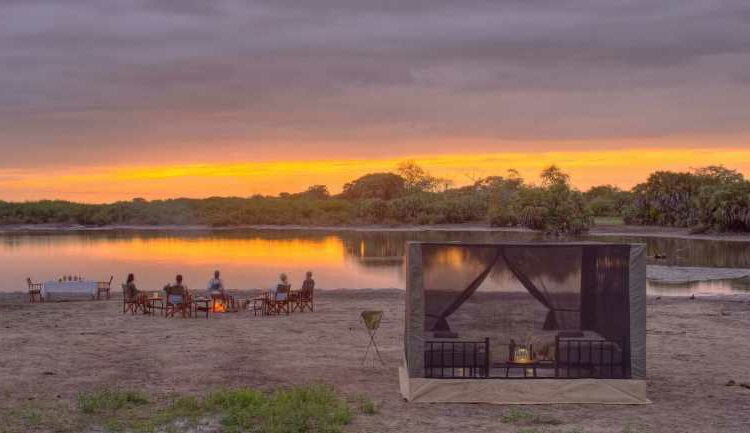A new “citizen science” experience is launching in Tanzania’s Ruaha National Park, giving guests a chance to be part of a hands-on conservation experience.
The experience is part of the new Usangu Expedition Camp in the wild and uncharted Usangu wetlands of Ruaha National Park. The four-tent camp, which will open in June as part of the Asilia Africa portfolio, will be the first tourism operation in the area and offers guests the chance to be part of a hands-on conservation experience.
Working hand-in-hand with local conservation efforts to discourage poaching, uplift local communities and assist in collecting meaningful scientific data, the camp will play a pivotal role in protecting the wetland area.
Reimagining the safari
“We are reimagining the traditional safari with the hope of giving
guests a deeper, hands-on conservation experience at the same time as
contributing meaningful scientific data to the research project,” said
Brandon Kemp, Asilia’s southern Tanzania director. “In order to
understand these vast wilderness areas that have not had a defined or
prolonged presence, we have launched a research-integrated safari. This
is an opportunity for our guests to engage with Tanzanian researchers in
our quest to better understand the area.”
Usangu Expedition Camp sits on the banks of the wetlands, at the heart of a 2,300-square-mile wilderness — an area roughly the size of Luxembourg. The only camp for almost 60 miles, guests can explore this game-rich wilderness on foot, on game drives and on canoeing and boating safaris. This is an area where herds of roan and sable graze and wild dogs hunt along riverbanks. Hundreds of ostriches congregate in a way that is not often seen elsewhere in Africa. Thousands of migratory bird species pass through the wetlands as well as unidentified amphibians, still waiting to be catalogued by scientists.
With only four tents, the camp will offer an exclusive experience. Every booking will receive its own private guide and vehicle, enabling guests to tailor their activities to their own personal interests. For the truly wild at heart, guests can embark on a sleep-out experience in the Usangu Star Cubes. These innovative cube tents allow for 270-degree views of the African night sky.
Tanzania: ‘Amazing … but under threat’
This pioneering conservation project is the latest initiative in what is now a six-year partnership between Asilia and British businessman Jim Ratcliffe, founder and chairman of Ineos, a global chemical firm that has been investing in renewable energy.
“Southern Tanzania is an amazing place, but it is under threat,” Ratcliffe said. “The creation of a sustainable and ecologically friendly safari tourism business will both protect the wildlife and help the people of this amazing region. I believe in sustainable conservation and know that the only way to ensure the long-term survival of unique and vulnerable habitats like those in northern Iceland and southern Tanzania are through projects like these, which protect the animals, preserve the environment and help the local community.”
Usangu Expedition Camp is part of an ambitious program to understand the health of the Usangu ecosystem and what lives there. Guests at the camp can join the resident researchers from the Douglas Bell Eco Research Station and truly participate in citizen science.
Guests will get a camera trap — a camera that is automatically triggered by activity in its vicinity — for the duration of their stay (one per couple/tent). The camera can be placed in and around camp and check what animals have visited the camp during the night.
For an in-depth understanding of the role camera traps play in wildlife audits, guests will also have the opportunity to help researchers collect camera traps farther afield and upload the images to the Predator ID Hub at the research station. They can then work with the researcher to ID the individual predators recorded or possibly identify a new individual. Equally important is tracking the research subjects fitted with GPS collars such as sable and roan antelope and recording their movements.
For an additional donation, guests will have the opportunity to join the research team in a wildlife collaring expedition as they track, dart and collar lions, leopards, elephants and wild dogs as well as a variety of antelope species.
The Usangu Wetlands are an area of critical conservation importance. They are the source of the Great Ruaha River, the lifeblood of southeastern Tanzania. The river provides water to Ruaha National Park, then joins the Kilombero River to create the Rufiji Delta, which is at the heart of Nyerere National Park. The water is not just essential to the wilderness and wildlife but is also the water source for the communities along its watercourse. Despite its importance, the area was an unprotected hunting reserve for almost 100 years until it was added into Ruaha National Park in 2006.
“Despite the uncertainties Covid-19 has brought, we remain committed to our mission to empower Africa’s wilderness areas,” said Jeroen Harderwijk, co-founder and CEO of Asilia. “We have long understood the importance of the wetlands, not just as a wilderness area of conservation importance but as the lifeblood of the great Ruaha River — and all that rely on it for survival. Creating a tourism presence in Usangu is the best chance we have for protecting wildlife and uplifting communities, and at Asilia, we have a proven track record in achieving this in East Africa. This project will show that wild areas do have value and importance and that their protection is an essential tool in economic development.”
Source: Read Full Article

![T0228AsiliaUsanguResearchTeam_C [credit: Courtesy of Asilia Africa] T0228AsiliaUsanguResearchTeam_C [credit: Courtesy of Asilia Africa]](https://ik.imgkit.net/3vlqs5axxjf/TW/ik-seo/uploadedImages/Art/2022/0228/T0228AsiliaUsanguResearchTeam_C/T0228AsiliaUsanguResearchTeam_C-credit-Courtesy-of.jpg)
![T0228AsiliaUsanguTentRend_C_HR [credit: Courtesy of Asilia Africa] T0228AsiliaUsanguTentRend_C_HR [credit: Courtesy of Asilia Africa]](https://ik.imgkit.net/3vlqs5axxjf/TW/ik-seo/uploadedImages/Art/2022/0228/T0228AsiliaUsanguTentRend_C_HR/T0228AsiliaUsanguTentRend_C_HR-credit-Courtesy-of-.jpg)